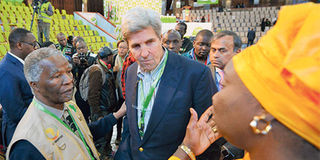Observers must live up to public expectation

Former US Secretary of State, John Kerry (centre) talks with former South Africa president and African Union observer Thabo Mbeki (left) and an independent observer at the national tally centre on August 9, 2017 in Nairobi. Nullification of the August 8 presidential results has brought into focus observer missions. PHOTO | TONY KARUMBA | NATION MEDIA GROUP
What you need to know:
In 1997 CJPC in Turkana monitored every polling station and volunteers remained awake for three days to ensure a fair ballot that resulted in the Opposition gaining its first parliamentary seat in a Kanu zone.
In 2002, a joint effort by CJPC, NCCK and Supkem ensured that every polling station in the country had a trained observer to record anomalies.
In the past three general elections, thousands of local and international observers have overseen the ballot but each time they failed to give any clear direction as to whether the ballot was credible.
The first Kenyan General Election I observed was the infamous ‘Mlolongo’ (queue) charade of 1988 when Kanu conspired to produce the most fraudulent outcome the country had ever witnessed.
President Moi and his cronies blatantly and unapologetically handpicked the winners and dared anyone to contest their choices or challenge their warped tallying.
Kanu in its arrogance and ignorance thought the election was a done deal. The NCCK, however, had other ideas and in the most daring defence of democracy and justice they produced a special edition of their monthly publication Beyond detailing how the ballot was stolen in constituencies all over the republic.
Moi immediately banned the magazine but it was too late. Kenyans hid copies under their mattresses and Beyond became the most seditious and delicious publication in Wanjiku’s possession.
The rest is history as the campaign for the repeal of Section 2(a) of the Constitution permitting multi-party democracy began with this expose on electoral fraud.
MADE IMPACT
This was the first serious attempt at monitoring Kenyan elections and it was arguably the most successful given the difficult and dangerous circumstances under which the NCCK operated. Observing the ballot has since become an integral element of the election process in Kenya but perhaps no organisation has made the same impact that the NCCK did 30 years ago.
There have been some notable successes, however. In 1997 CJPC in Turkana monitored every polling station and volunteers remained awake for three days to ensure a fair ballot that resulted in the Opposition gaining its first parliamentary seat in a Kanu zone. In 2002, a joint effort by CJPC, NCCK and Supkem ensured that every polling station in the country had a trained observer to record anomalies.
Yet these were hardly needed since Mwai Kibaki had such a clear cut victory that it would have been well nigh impossible to alter the results.
INTERNATIONAL OBSERVERS
In the past three general elections, thousands of local and international observers have overseen the ballot but each time they failed to give any clear direction as to whether the ballot was credible.
Much has been written about the international observers’ blunder in giving the IEBC a clean bill of health this time. But equally at fault are the hundreds of domestic observers operating under the banner of ELOG. Unprepared, unprofessional and understaffed, they promised much but ended up a disservice to the public by failing to notice the illegalities and irregularities that the Supreme Court uncovered.
It was only the Kura Yangu Sauti Yangu alliance that cried foul. After raising the alarm bells, the hounds of the NGO Council were unleashed on both KHRC and AfriCog to preoccupy them and intimidate them into silence. Four weeks remain until the fresh ballot. The IEBC has listed today as the final day for organisations to submit their observers’ lists. Rushing their registration appears like a sinister move intended to lock many observers out.
The same IEBC has been found wanting and culpable of electoral mismanagement. Cosmetic changes will give us another shambolic ballot and probably violence. But will observers once more give approval for the sake of ‘stability’? This time they must do it professionally or stay at home.
Fr Gabriel Dolan is a Catholic priest based in Mombasa. [email protected] @GabrielDolan1





